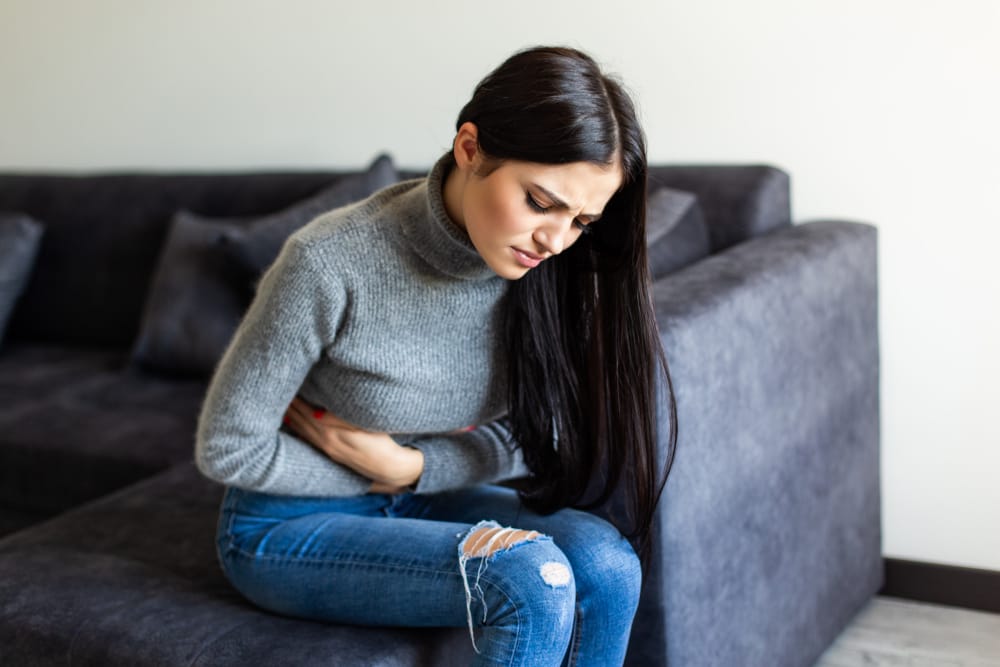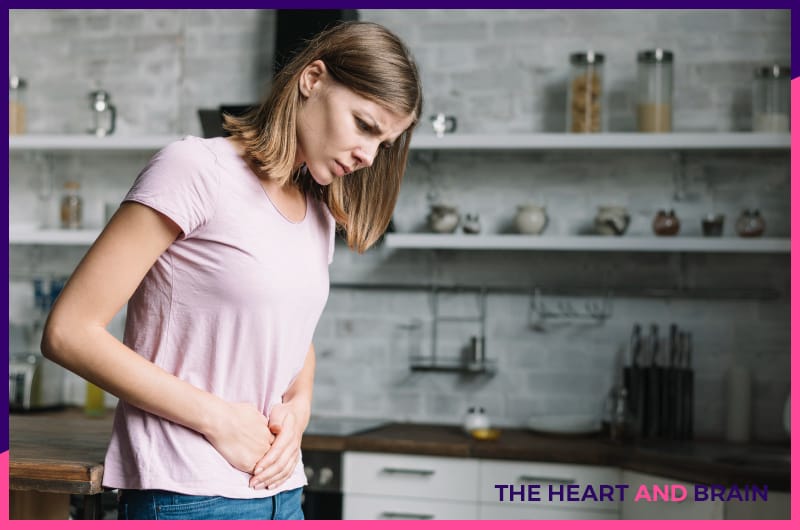There could be a lot of uncomfortable symptoms when you are on your period, including lower back pain, cramps, headache, bloating, sore breasts, mood swings, and irritability. Some might also experience fatigue or even feel weak or shaky. Weakness during menstruation is usually caused by the loss of fluid and blood during your period, which is normal due to the decrease in estrogen levels.
Your energy levels will usually return to normal within a few days as your hormone levels begin to increase again.
This is something you should not be too worried about unless it comes with other symptoms that are not related to your menstruation.
Common symptoms of menstruation
1. Abdominal cramps

Menstrual cramps are felt in the lower abdomen, and these cramping feelings may also radiate out toward your lower back and upper thighs.
It can start days before your period and last for several days or longer once your period starts. The pain may range in severity from dull, minor aches to extreme pain that stops you from doing your usual activities.
Cramps are caused by uterine contractions, which help shed the inner lining of the uterus (endometrium) when a pregnancy does not occur.
The production of fatty-acid hormones called prostaglandins triggers these contractions. Although these lipids cause inflammation, they also help regulate ovulation and menstruation.
2. Lower back pain
Changes in natural chemicals called prostaglandins that line the uterus cause contractions that you could also feel in your back or thighs.
Some might feel an aching or pulling feeling, while others experience mild discomfort or a nagging feeling in their back.
3. Bloating
Changes in estrogen and progesterone levels can cause your body to retain more water and salt than usual, resulting in a bloated feeling.
Most women get relief from this symptom 2 to 3 days after their period starts.
4. Breakouts
This is one of the most common symptoms of PMS. One study shows that around half of the women they observed noticed an increase in acne about a week before their period started.
Acne is caused by the natural hormonal changes associated with the female reproductive cycle.
5. Sore or tender breasts
Menstruation-related breast pain is also called cyclical breast pain.
Right after ovulation until a few days after period bleeding starts, you might feel your breast tender or swollen due to progesterone levels starting to rise and making the mammary glands in your breasts enlarge and swell.
6. Mood swings
Fluctuating estrogen and progesterone levels may be to blame for the roller coaster of emotions that some women experience days before their menstruation or while on their period.
Estrogen can affect the production of serotonin and feel-good endorphins in the brain, decreasing feelings of well-being and increasing depression and irritability.
Low levels of progesterone could have that same effect too.
7. Headache
Changes in estrogen levels are to blame if you get headaches before your period. If you’re prone to migraines, you’ll probably find that you get them before your period.
Fluctuating hormonal levels might cause headaches and migraines since hormones are responsible for generating the pain response.
Serotonin is a neurotransmitter that often sets off migraine and headaches when its levels fluctuate.
Estrogen may increase serotonin levels and the number of serotonin receptors in the brain at certain points during the menstrual cycle.
8. Fatigue or low energy
As your period approaches, your body shifts gears from getting ready for a pregnancy to getting ready to menstruate.
Shifting hormones disturb your sleep patterns and make you feel tired. Changes in estrogen and progesterone may also increase core body temperature, especially when sleeping.
You’re more likely to get good sleep when your core body temperature decreases.
9. Bowel issues
The prostaglandins that cause uterine contractions to happen can also cause contractions to take place in the bowels, because of the close proximity of the organs.
You might have more frequent bowel movements during menstruation, or experience diarrhea, gassiness, and constipation.
Home remedies and lifestyle changes
Symptoms of PMS are different from one woman to another. The severity could also go from mild to extreme depending on your body, your diet, hormones, and your lifestyle as a whole.
Consulting an OB-GYN will also be a great recommendation for those with more complicated symptoms and experiences.
For those women who are getting mild to moderate symptoms, there are some home remedies and lifestyle guidelines that you could follow to try and ease the symptoms of discomfort during your period.
1. Be mindful of your diet
The most common dietary recommendations for managing period symptoms are limiting sugar intake and getting enough complex carbohydrates in your diet, such as fruits, vegetables, and whole grains.
Some people may benefit from reduced sodium intake, which may help to reduce bloating, water retention, and breast swelling and tenderness. Choose foods rich in calcium.
If you can’t tolerate dairy products or aren’t getting adequate calcium in your diet, a daily calcium supplement may help.
For those having mood swings and trouble sleeping, you might want to cut down some caffeine intake to ease these symptoms.
2. Exercise regularly

Regular daily exercise can help improve your overall health and ease certain symptoms, such as fatigue and a depressed mood.
Activities such as brisk walking, jogging, swimming, or cycling release endorphins, dopamine, and serotonin (chemical messengers that can boost mood) and positively impact energy and sleep.
Light stretching may help with period pains and menstrual cramps.
3. Aromatherapy
Aromatherapy uses aromatic essential oils medicinally to improve the health of the body, mind, and spirit.
It enhances both physical and emotional health, works through the sense of smell and skin absorption using products such as diffusers, aromatic spritzers, hot and cold compresses, to name a few among the others.
4. Meditation

Mindful meditation can reduce common symptoms of PMS like anxiety, depression, and pain.
It requires you to focus on the present moment and concentrate on your breathing which can help you relax and detach from uncomfortable symptoms.
5. Get good sleep
Try to get at least 8 hours of sleep. If this is not possible, get as much sleep as possible.
A good uninterrupted sleep could be exactly what your body needs during PMS. It will help you reduce irritability and fatigue.
6. Record your symptoms

Keeping track of what’s going on in your body is always the idea, especially if you’re trying to understand how your body reacts and make it better.
Writing down what you feel at a certain time within your menstruation cycle will help you explain yourself better to your doctor or healthcare provider.
7. Get checked regularly
You don’t need to feel something bad before you see a doctor. Prevention is still better than any cure, after all.
Making a regular appointment with your OB-GYN should be part of your routine to avoid unexpected situations as much as possible.
Just by giving them a rundown of your usual PMS symptoms might be exactly what you need to better navigate and manage it.
FAQs
How can I reduce my weakness during periods?
Feeling weak or tired during your period is normal, especially with everything your body is going through. Getting a good night’s sleep could help.
Also, finding some time to relax and eating healthy foods can help boost your energy during this time.
Should you sleep more during your period?
Getting a better sleep during periods can help ease the painful cramps, improve your mood, reduce fatigue and discomfort, and make the period cycle more comfortable.
Even though we know that getting a good night’s sleep is essential, research shows that women aren’t getting enough of it.
Conclusion
The list of the changes a woman’s body goes through every month is long and can sometimes be overwhelming. You can never really get used to it.
Your symptoms change as you age, and it’s just never the same each month, to be honest! Having to endure these symptoms regularly could be draining, and it could wear you off.
Take good care of yourself, be mindful of what you eat, boost your strength by being as active as you can, get yourself some time to relax, and have a good amount of sleep.
We know that you are doing the best you can, keep it up! Ask for help if you need to, it’s perfectly fine. Everyone needs a helping hand every once in a while.


